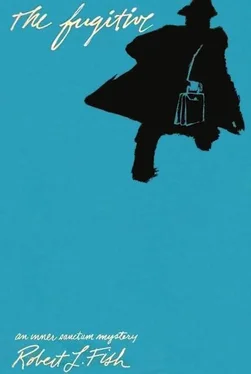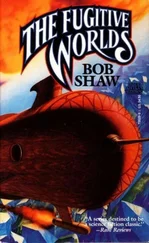“Somebody ought to hang a bell on the people who keep trying to kidnap him,” Da Silva said reasonably. “It would make it easier for us.” He scratched at his beard again. The car ahead inched forward a few feet and then stopped. He grasped Wilson’s arm. “Well, well, well,” he said with a chuckle. “Look at that! Maybe we won’t have to make like heroic Marines dashing to the rescue after all!”
Wilson sat erect and pushed his veil aside, peering ahead. A dancing group from one of the Carnival clubs, all attired in brightly striped prison uniforms, had been winding their way down the street when they noticed one of their fellows in the car ahead. He seemed to be arguing with his fellow passengers, all of whom were attired as police. The dancing group immediately stopped their jingling rhythm and swarmed about the parked car enthusiastically.
The first mistake the driver of the roadster made was to attempt to press through the crowded street, for this was manifestly impossible. His second mistake was even worse; he began to beat at the surrounding crowd with his white-gloved hands. Ari immediately stood up and tried to step over the side of the car, but his companion jerked him down again. A roar came from the striped crowd, a roar composed equally of pleasure at the thought of tumbling even pseudo-policemen into the gutter, and the satisfying thought of rescuing one of their members from a spot where he obviously didn’t wish to remain. The tall Keystone cop in the back seat with An suddenly realized the seriousness of the situation and, rising to his feet, began his pantomime performance, but he was too late. The striped mob about the car were displeased by the slapping hands and in no mood to be placated by histrionics.
“My, my,” Da Silva murmured, slipping the car into neutral and setting the hand brake. “This is a change!” He grinned at his unveiled companion. “This is one of the times when I’m proud to be a Brazilian,” he said. “Brazil! Carnival! I love you!”
Wilson, who had intelligently left his package of cigarettes on the seat beside him instead of reburying it in the multiple pleats of his harem pants, now lit one and leaned forward, watching the activity in their front with glee. “There should be a charge for this,” he said happily, “Best show I’ve seen since the old Mack Sennett days!”
The crowd of prison-uniformed Carnival dancers now surrounded the car in front, and were beginning to get out of hand. Anger, that delicate emotion that always lies so close to the surface of jangled nerves, even though those nerves be jangled with joy, now swept the crowd. Enraged by the pushing and slapping hands, the mob suddenly decided to overturn the car and see what came out. But their loyalty required that their fellow prisoner be freed first; one of the larger dancers swung himself into the back seat and calmly lifted Ari, depositing him in the forest of arms that were raised to receive him. This done, he jumped back to the street and joined with his fellows in destroying this car that had insulted them.
The little potbellied figure in the prisoner suit did not wait to see the final act of his rescue; as soon as the helping hands dropped from his arms, he darted off through the crowd and was soon lost to sight.
Da Silva turned to Wilson, smiling happily. “And so,” he said with a wicked gleam in his eye, “as the sun sinks slowly in the west, and our Jaguar pulls silently, more or less, away from the curb, we say, ‘Farewell to the entertaining Keystone Cops.’ And their open roadster!” He put the car into reverse, looking back over his shoulder. “This seems to be no place for a peace-loving man,” he added. “Shall we go?”
It was a grim-faced group that had gathered in the locked room of the Richereau apartment in the small hours of the following morning. A sudden request by Madame Richereau to some of her guests to stop by after the party at the Fasano Roof for a nightcap — a request whispered in their ears while dancing — had somehow managed to include Strauss, and somehow managed to exclude Ari. He, having enjoyed himself immensely, had taken a cab back to his hotel, after having regaled everyone with a story of his ludicrous capture and even more ludicrous release. His eyes had sparkled as he told of his adventure, but they had swept the faces of the guests very carefully, also.
Now the last celebrant of the apparently inexhaustible crowd had finally filed reluctantly to the elevator, still singing drunkenly; now Deputado Strauss had somehow managed to remain behind, escaping this exodus in his search for the bathroom; now they were once more seated across from von Roesler. The room also contained a visitor from Rio de Janeiro; a large clown whose mask had been pushed up and out of the way to reveal the heavily eye-browed and whitely toothed Herr Mathais. Von Roesler sat glowering at the three of them, his hands pressed violently into the pockets of his bathrobe, as if to contain by force his displeasure.
“It was a mistake,” Strauss was saying defensively. His big fingers rolled his little feathered cap about with faint nervousness. “I knew at the time it was a mistake. I said it was a mistake.”
“It was bad luck,” Monica said quietly, “running into a club with the same costumes.”
Mathais sat quietly. Not having been involved in the fiasco, he sat back and watched the others with an expressionless face.
Von Roesler sneered, eying them all with impartial disgust. “There is no such thing as bad luck,” he said, his eyes marching steadily from one to the other, a professor on a lectern propounding basics to poorly prepared students. “There is only bad planning. It was a stupid idea from the beginning, trying to take him in front of a roomful of people!”
Strauss could not help himself. “It was a stupid idea from the beginning,” he muttered under his breath.
Von Roesler looked up at this interruption. “What? Did you say something?”
The big man looked up from his feathered cap. “You should have met with him,” he said doggedly. “None of this would have happened if you had met with him.”
Von Roesler dismissed this as pure negativism. “And now what do you intend to do?” It was a statement more than a question, but Strauss chose to interpret it as a query.
“Well, one thing I don’t think we should do,” he said, “is to attempt any more kidnappings!”
“No?” von Roesler said sarcastically.
“I agree with Strauss,” Mathais suddenly said from his chair in the corner. He spoke in a firm, positive voice. Of the three of them, he seemed the least afraid of, or impressed by the bathrobed man behind the desk. “He was picked up twice, once in Rio and once here in São Paulo. The one in Rio can be explained; actually it helped us. But it will be very hard to explain the one in São Paulo.” He shrugged. “This Herr Busch is no fool. One day Strauss asks him for money and he refuses; the next day he is kidnapped. What do you imagine he is going to think?”
“I was against it from the beginning,” Strauss began, but Monica broke into me conversation.
“There is no point in repeating that stupid statement endlessly,” she said with irritation. “It was an idea and it didn’t work. Let’s not talk about it any more.”
“I just want to make sure that we don’t decide to try it again,” Strauss insisted stubbornly.
“Again I agree with Strauss,” Mathais said. “If there should be any more of these attempts, the only thing we will accomplish is to frighten him away from Brazil. He’ll simply leave.”
“And leave the money?” von Roesler sneered.
“He brought the money in, right under our nose, and we don’t know how,” Mathais said boldly, looking von Roesler in the eye. “I’m sure he can take it out again, probably also under our nose, and we still won’t know how he managed.” His glance never wavered. “You all continue to think that Herr Busch is a fool. I know him, and I tell you that he is far from a fool.”
Читать дальше












